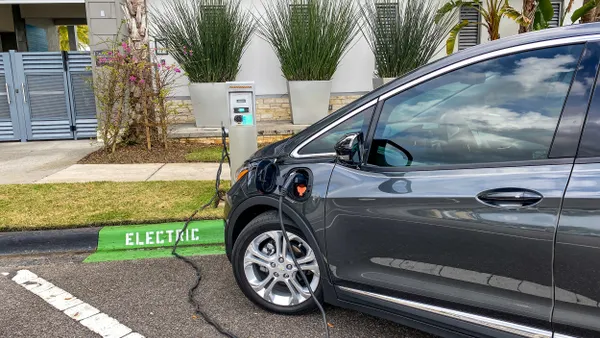Dive Brief:
- Ride-hailing app Lyft and mobility technology company Magna will partner to jointly fund, develop and manufacture self-driving systems for autonomous vehicles (AVs). Magna will invest $200 million in Lyft as part of the "multi-year" partnership.
- Lyft will lead the co-development of self-driving systems at its Palo Alto, CA testing center, with Magna leading manufacturing. The two companies will share data, including from what the company said was five billion miles driven each year on the Lyft network. The technology is expected to be ready for wider use in the next few years, which Magna can then deploy across the industry.
- "There is a new mobility landscape emerging and partnerships like this put us at the forefront of this change," Swamy Kotagiri, Magna’s Chief Technology Officer, said in a statement. Lyft CEO Logan Green said the approach is one that will "democratize access" to AV technology.
Dive Insight:
The AV arms race appears to be heating up with this partnership, which unites a major ride-hailing app and one of the world’s largest car suppliers. But Lyft still has plenty of catching up to do, as it is far behind rival Uber in testing AVs, which it launched in 2016 before moving on to testing self-driving cargo trucks. This pact between Lyft and Magna could help close the gap on Uber, given Magna’s expertise in this field already, including on systems knowledge.
TechCrunch noted the significance of the testing and manufacturing by both companies taking place at Lyft’s testing grounds in Palo Alto, where engineers and other staff will work side by side on developing this technology. That shows the importance Lyft is placing on its testing facility, and continues its emphasis on efficient testing and technological advancement.
And CNBC reported that, on a conference call with investors and analysts on Thursday morning, Kotagiri said Magna will be Lyft’s exclusive supplier of AV kits. While Magna is not the only company that works on AVs, having and exclusive partnership will help Lyft fully tap into this knowledge base without any of their competitors doing the same.
It also builds on what has been a strong year so far for Lyft, which has strengthened commitments to shared mobility, developed innovative partnerships with leading cities and announced the launch of its own healthcare platform. While some of its competitors have made more progress, Lyft has made great strides to stay competitive.












